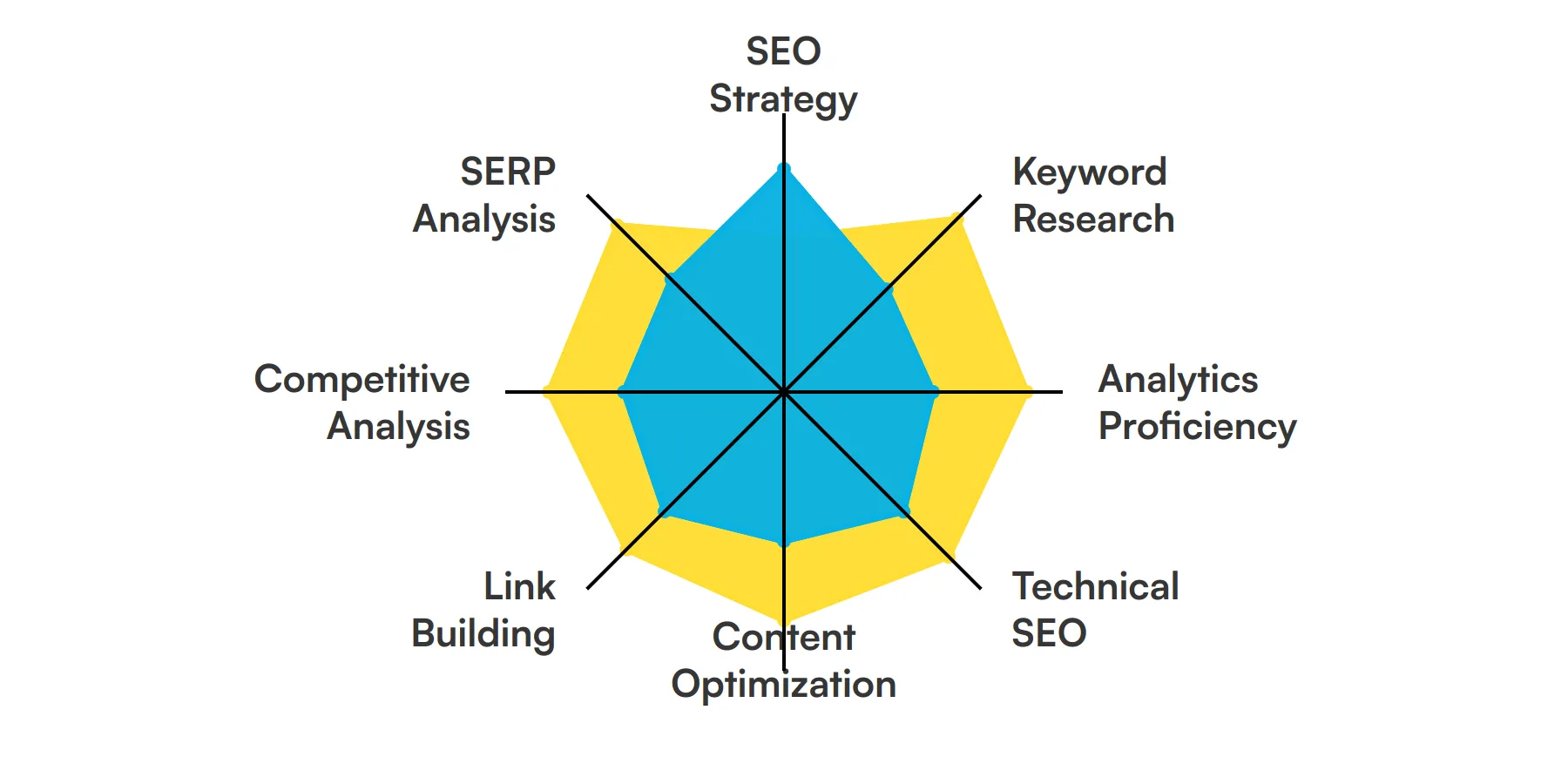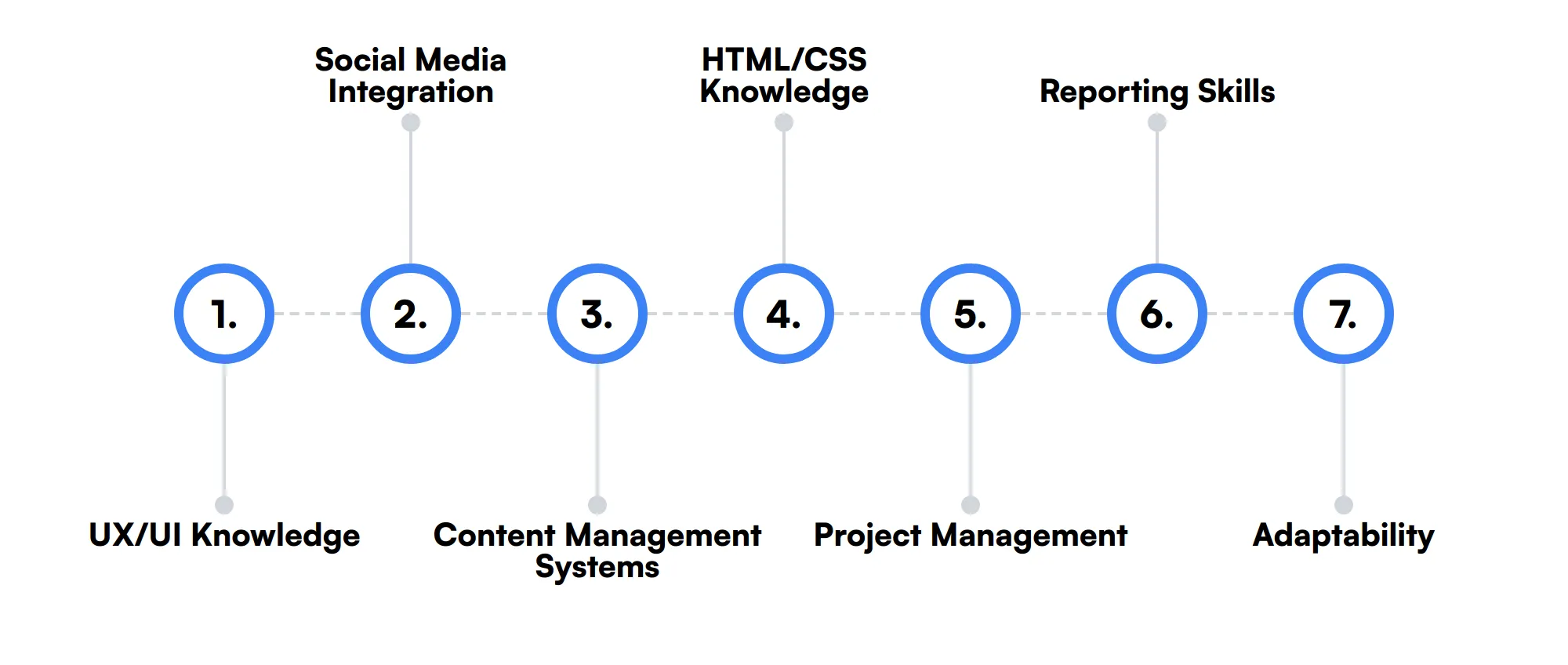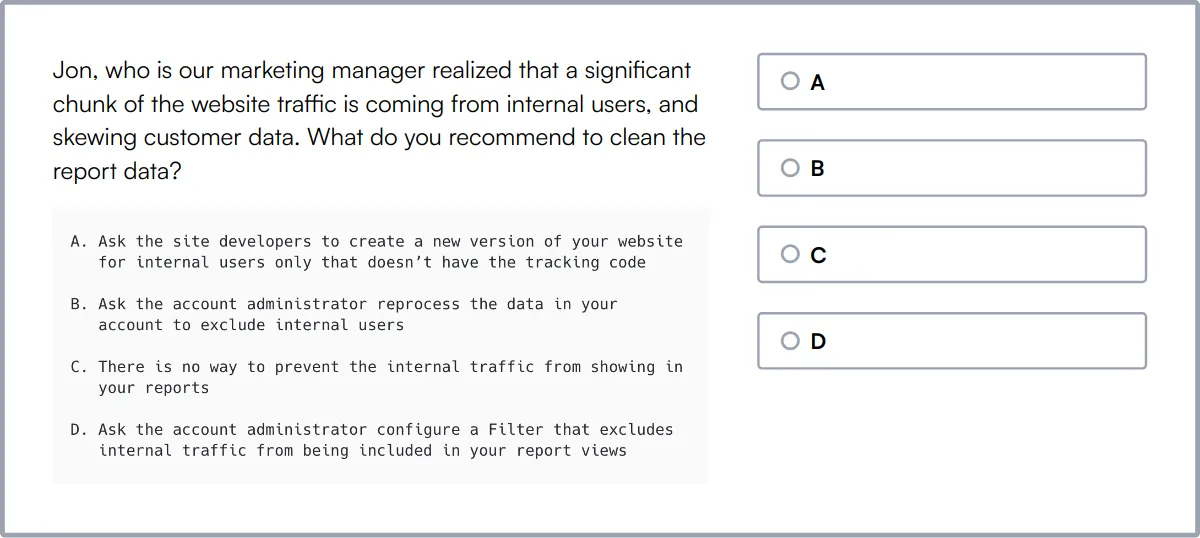An SEO Manager plays a key role in enhancing a website's visibility on search engines. They are responsible for developing and implementing strategies to improve search engine rankings, driving organic traffic, and ultimately increasing conversions.
SEO Manager skills include a deep understanding of search engine algorithms, keyword research, and on-page and off-page optimization techniques. Additionally, they must possess analytical skills to interpret data and communication skills to collaborate with content creators and developers.
Candidates can write these abilities in their resumes, but you can’t verify them without on-the-job SEO Manager skill tests.
In this post, we will explore 8 essential SEO Manager skills, 7 secondary skills and how to assess them so you can make informed hiring decisions.
Table of contents
8 fundamental SEO Manager skills and traits
The best skills for SEO Managers include SEO Strategy, Keyword Research, Analytics Proficiency, Technical SEO, Content Optimization, Link Building, Competitive Analysis and SERP Analysis.
Let’s dive into the details by examining the 8 essential skills of a SEO Manager.

SEO Strategy
An SEO Manager must develop and oversee the implementation of comprehensive SEO strategies. This involves understanding the business goals, analyzing market trends, and aligning SEO activities to enhance search engine rankings and drive targeted traffic.
For more insights, check out our guide to writing a SEO Manager Job Description.
Keyword Research
Effective keyword research is fundamental for an SEO Manager. It involves identifying relevant keywords that potential customers are using to search for products or services. This skill helps in optimizing content and structuring websites to improve visibility and rankings.
Analytics Proficiency
An SEO Manager uses analytics tools to track website performance and user engagement. This skill is crucial for making data-driven decisions to refine SEO strategies and report on ROI to stakeholders.
Check out our guide for a comprehensive list of interview questions.
Technical SEO
Technical SEO involves optimizing website architecture, improving site speed, and ensuring that websites are mobile-friendly. An SEO Manager needs to collaborate with web developers to implement these technical changes that are critical for improving search rankings.
Content Optimization
This skill entails creating and modifying content to make it more appealing to search engines and users. An SEO Manager ensures that content is not only informative but also optimized for the best possible search engine ranking.
For more insights, check out our guide to writing a Content Manager Job Description.
Link Building
Link building is about acquiring high-quality inbound links to boost domain authority and improve search rankings. An SEO Manager needs to strategize and execute link building campaigns while maintaining the integrity of the website’s profile.
Competitive Analysis
Understanding and analyzing competitors' SEO strategies is key for an SEO Manager. This insight helps in identifying opportunities for improvement and developing strategies to gain competitive advantage in search rankings.
Check out our guide for a comprehensive list of interview questions.
SERP Analysis
Search Engine Results Page (SERP) analysis helps an SEO Manager understand the current landscape of search results for key queries. This skill is used to identify trends, benchmark performance, and adapt SEO strategies accordingly.
7 secondary SEO Manager skills and traits
The best skills for SEO Managers include UX/UI Knowledge, Social Media Integration, Content Management Systems, HTML/CSS Knowledge, Project Management, Reporting Skills and Adaptability.
Let’s dive into the details by examining the 7 secondary skills of a SEO Manager.

UX/UI Knowledge
Understanding user experience (UX) and user interface (UI) design principles helps an SEO Manager ensure that a website is not only optimized for search engines but also provides a positive user experience.
Social Media Integration
Integrating SEO efforts with social media can enhance content visibility and drive more organic traffic. An SEO Manager often coordinates with social media teams to align strategies.
Content Management Systems
Familiarity with various Content Management Systems (CMS) allows an SEO Manager to implement changes directly and manage content effectively across different platforms.
HTML/CSS Knowledge
Basic knowledge of HTML and CSS is beneficial for an SEO Manager to understand the structural and design elements of web pages that can impact SEO.
Project Management
SEO projects often involve multiple stakeholders and components. Skills in project management help an SEO Manager to keep projects on track, manage resources, and meet deadlines.
Reporting Skills
Ability to create detailed reports is important for an SEO Manager to communicate the progress and success of SEO initiatives to clients or internal stakeholders.
Adaptability
Search engine algorithms are constantly changing. An SEO Manager must be adaptable, staying updated with the latest trends and adjusting strategies as necessary.
How to assess SEO Manager skills and traits
Assessing the skills and traits of an SEO Manager can be a challenging task, given the diverse range of expertise required in this role. From crafting effective SEO strategies to conducting in-depth keyword research, an SEO Manager must wear many hats. It's not just about having the right skills on paper; it's about demonstrating proficiency in real-world scenarios.
Traditional resumes and interviews often fall short in revealing a candidate's true capabilities. This is where skills-based assessments come into play. By leveraging tools like Adaface assessments, you can gain a clearer picture of a candidate's strengths and weaknesses. These assessments can help you achieve a 2x improved quality of hires and an 85% reduction in screening time.
When evaluating an SEO Manager, consider their proficiency in key areas such as SEO strategy, keyword research, analytics, technical SEO, content optimization, link building, competitive analysis, and SERP analysis. Each of these skills plays a critical role in driving organic traffic and improving search engine rankings. By using targeted assessments, you can ensure that your candidate is well-equipped to handle the multifaceted demands of the role.
Let’s look at how to assess SEO Manager skills with these 2 talent assessments.
PPC Assessment Test
Our PPC Assessment Test evaluates a candidate's proficiency in pay-per-click advertising, digital marketing, and online advertising. This test is designed to assess their ability to manage and optimize PPC campaigns effectively.
The test covers keyword research, ad copywriting, bid management, landing page optimization, conversion tracking, and campaign performance analysis. Candidates are required to navigate through scenario-based multiple choice questions that reflect real-world PPC challenges.
High-scoring candidates demonstrate strong skills in budget management, market analysis, and analytics and reporting. They also show a deep understanding of how to drive targeted traffic and maximize ROI through well-optimized PPC campaigns.
Google Analytics Test
Our Google Analytics Test assesses a candidate's ability to use the Google Analytics platform to make data-driven decisions. This test evaluates their skills in setting up and customizing reports, tracking website traffic, and analyzing user behavior.
The test includes questions on setting up Google Analytics, creating and customizing reports, tracking website traffic, analyzing user behavior, and setting up goals and conversions. Candidates must demonstrate their ability to implement e-commerce tracking and use Google Analytics for marketing campaigns.
Successful candidates show proficiency in advanced analytics techniques, Google Analytics API, and Google Tag Manager integration. They are adept at driving more targeted traffic and generating leads through data-driven insights.

Summary: The 8 key SEO Manager skills and how to test for them
| SEO Manager skill | How to assess them |
|---|---|
| 1. SEO Strategy | Evaluate ability to develop and execute effective SEO plans. |
| 2. Keyword Research | Assess proficiency in identifying and prioritizing target keywords. |
| 3. Analytics Proficiency | Check capability to interpret and leverage data from analytics platforms. |
| 4. Technical SEO | Review understanding of website technical factors affecting search rankings. |
| 5. Content Optimization | Determine skill in enhancing content for better SEO performance. |
| 6. Link Building | Examine strategies for acquiring quality inbound links. |
| 7. Competitive Analysis | Assess ability to analyze and strategize against competitors. |
| 8. SERP Analysis | Evaluate skill in examining search engine results pages for insights. |
SEO Online Test
SEO Manager skills FAQs
What is the importance of SEO strategy in an SEO Manager role?
An SEO strategy outlines the plan to improve a website's search engine rankings. It includes setting goals, identifying target audiences, and planning content and technical improvements.
How can you assess an SEO Manager's keyword research skills?
Evaluate their ability to use tools like Google Keyword Planner, SEMrush, or Ahrefs. Ask for examples of keyword research they've conducted and how it impacted traffic.
Why is analytics proficiency important for an SEO Manager?
Analytics proficiency helps in tracking and measuring the performance of SEO efforts. Familiarity with Google Analytics and other tools is essential for data-driven decision-making.
What technical SEO skills should an SEO Manager possess?
They should understand site architecture, crawlability, indexability, and be able to perform technical audits. Knowledge of tools like Screaming Frog and Google Search Console is beneficial.
How do you evaluate an SEO Manager's content optimization skills?
Review their ability to optimize content for keywords, readability, and user engagement. Ask for examples of content they've optimized and the results achieved.
What is the role of link building in SEO, and how can you assess it?
Link building improves a site's authority and rankings. Assess their experience with outreach, relationship building, and using tools like Moz or Ahrefs for link analysis.
How important is UX/UI knowledge for an SEO Manager?
Good UX/UI enhances user experience and can improve SEO rankings. Assess their understanding of how design impacts SEO and their ability to work with design teams.
What project management skills are necessary for an SEO Manager?
They should be able to plan, execute, and monitor SEO projects. Familiarity with project management tools like Trello or Asana and experience in leading teams is important.

40 min skill tests.
No trick questions.
Accurate shortlisting.
We make it easy for you to find the best candidates in your pipeline with a 40 min skills test.
Try for freeRelated posts
Free resources



